Online ecommerce courses are classes designed to give business owners selling products and services online the tools they need to start, launch, and scale their ecommerce business.
Whether you’re looking for an introduction to ecommerce fundamentals or an in-depth exploration of a specific topic, an ecommerce course can help cut the learning curve, boost profits, and reach your business goals.
10 best ecommerce courses
- E-Commerce Essentials: How to Start a Successful Online Business
- How to Become a Shopify Expert (From Zero to Hero!)
- Ecommerce Masters by Foundr
- Ecommerce Marketing Training Course
- Foundations of Digital Marketing and E-commerce by Google
- SEO Training for Beginners
- Foundations: Introduction to Cross-Border Selling
- Ecommerce Marketing Certification by CXL
- Ecommerce Fundamentals by LinkedIn
- Become a Certified Ecommerce Marketing Master by Digital Marketer
1. E-Commerce Essentials: How to Start a Successful Online Business
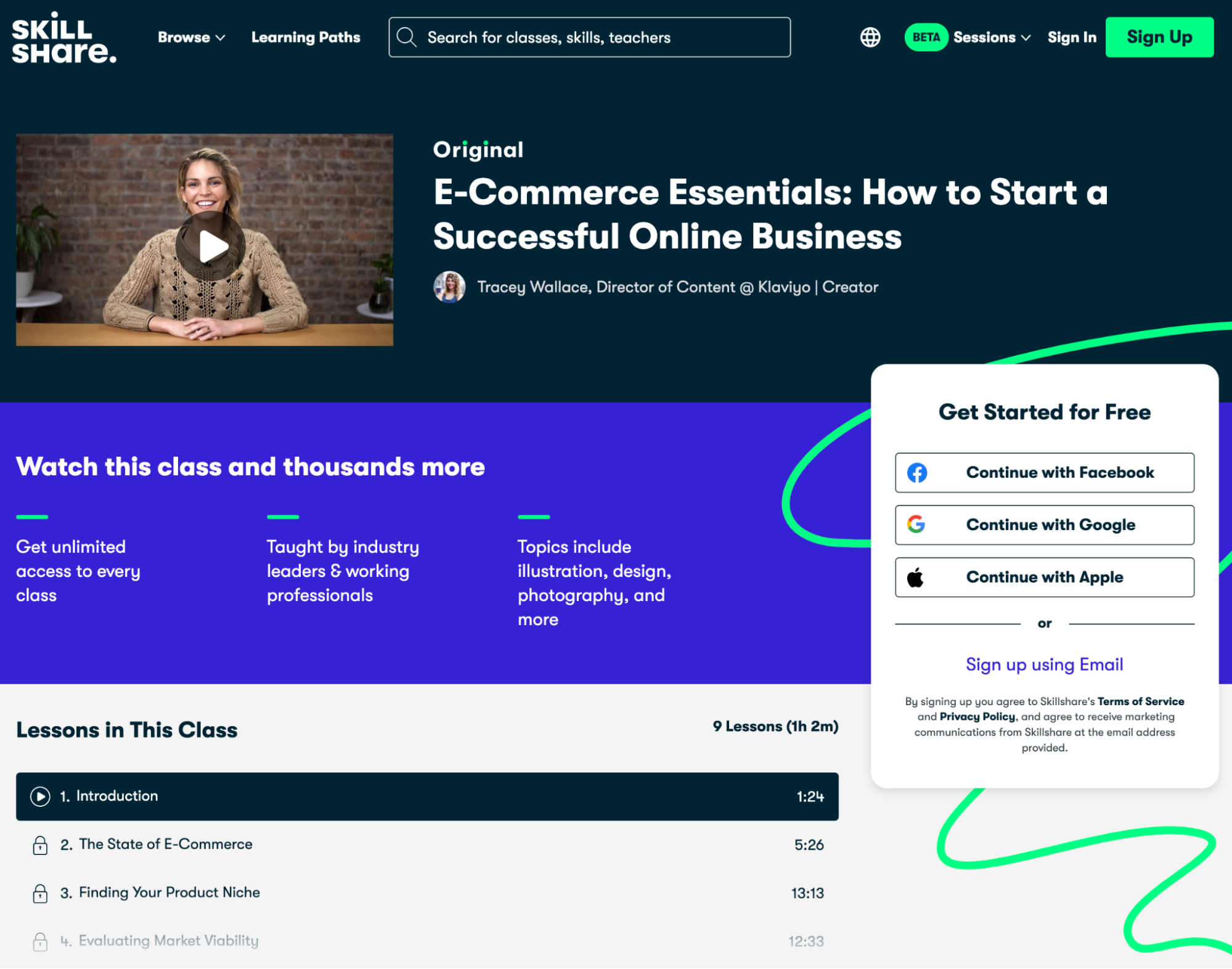
Instructor: Tracey Wallace
This Skillshare course covers ecommerce fundamentals like choosing a product, conducting market research, selecting an ecommerce platform, and improving profitability. You’ll learn how to perform a competitor analysis and use content marketing to differentiate yourself in the online marketplace.
Tracey Wallace uses this ecommerce course to share her step-by-step approach, beginning with the fundamentals and progressing through her steps of launching a store.
Cost: $32/month or free one-month trial
Length: 1 hour 3 minutes
2. How to Become a Shopify Expert (From Zero to Hero!)
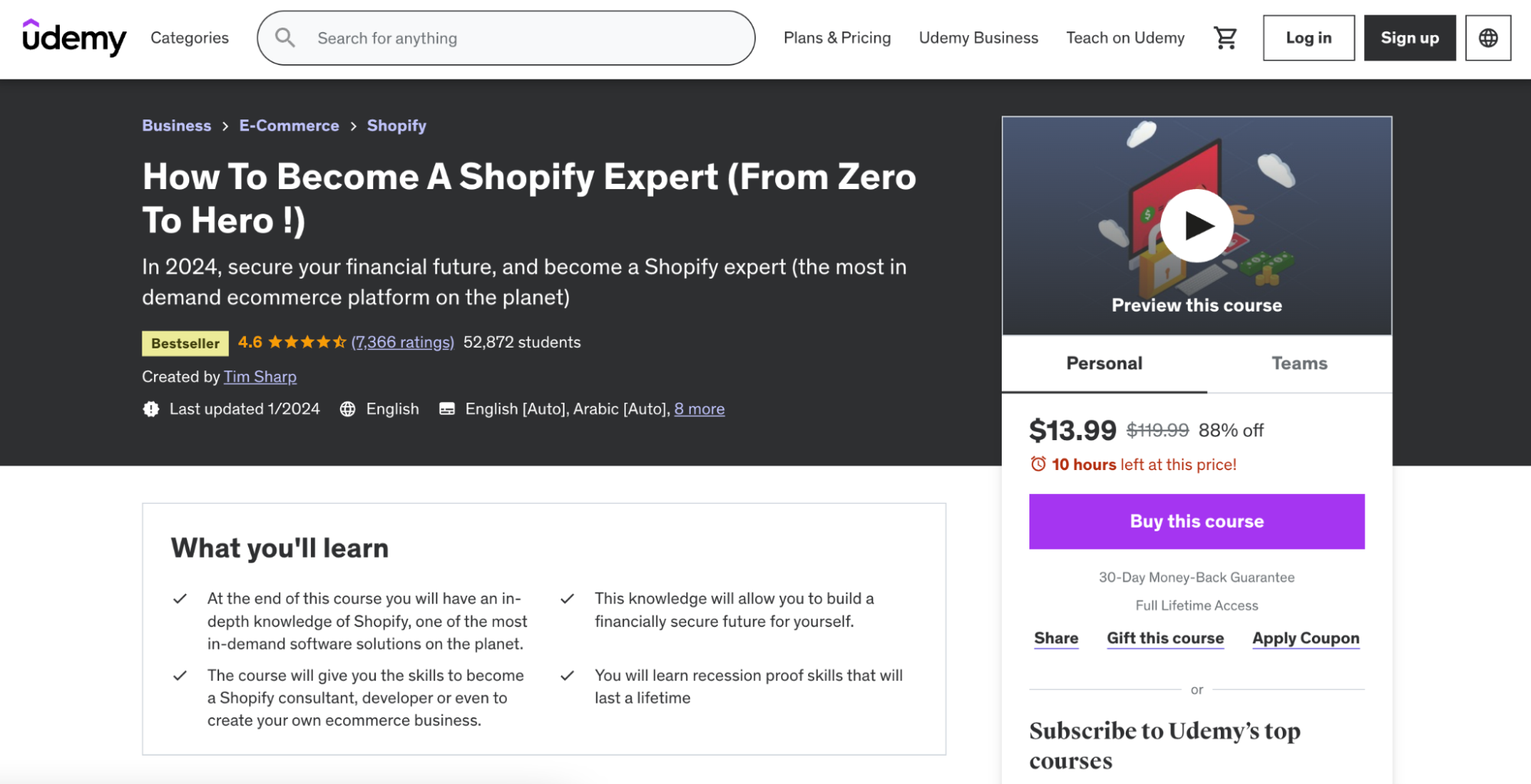
Instructor: Tim Sharp
Tim Sharp has been an online entrepreneur since 2004. His Udemy course, “How to Become a Shopify Expert (From Zero to Hero!), is a highly regarded and popular ecommerce course for learning about Shopify. It has a 4.6 out of 5 star rating, with more than 7,300 reviews from past students.
Sharp’s course covers everything to do with mastering Shopify, including setting up a free Shopify account, choosing your payment provider, and managing abandoned carts. It’s user-friendly and accessible, even for those without a technical background. The course consists of 94 lectures and is a little over five hours long, which you can complete over a weekend.
This ecommerce course is perfect for anyone aspiring to open an online store, freelancers who want to learn something new, or dropshippers who want to use the best ecommerce platform for their business.
Cost: $13.99
Length: 5 hours
3. Ecommerce Masters by Foundr
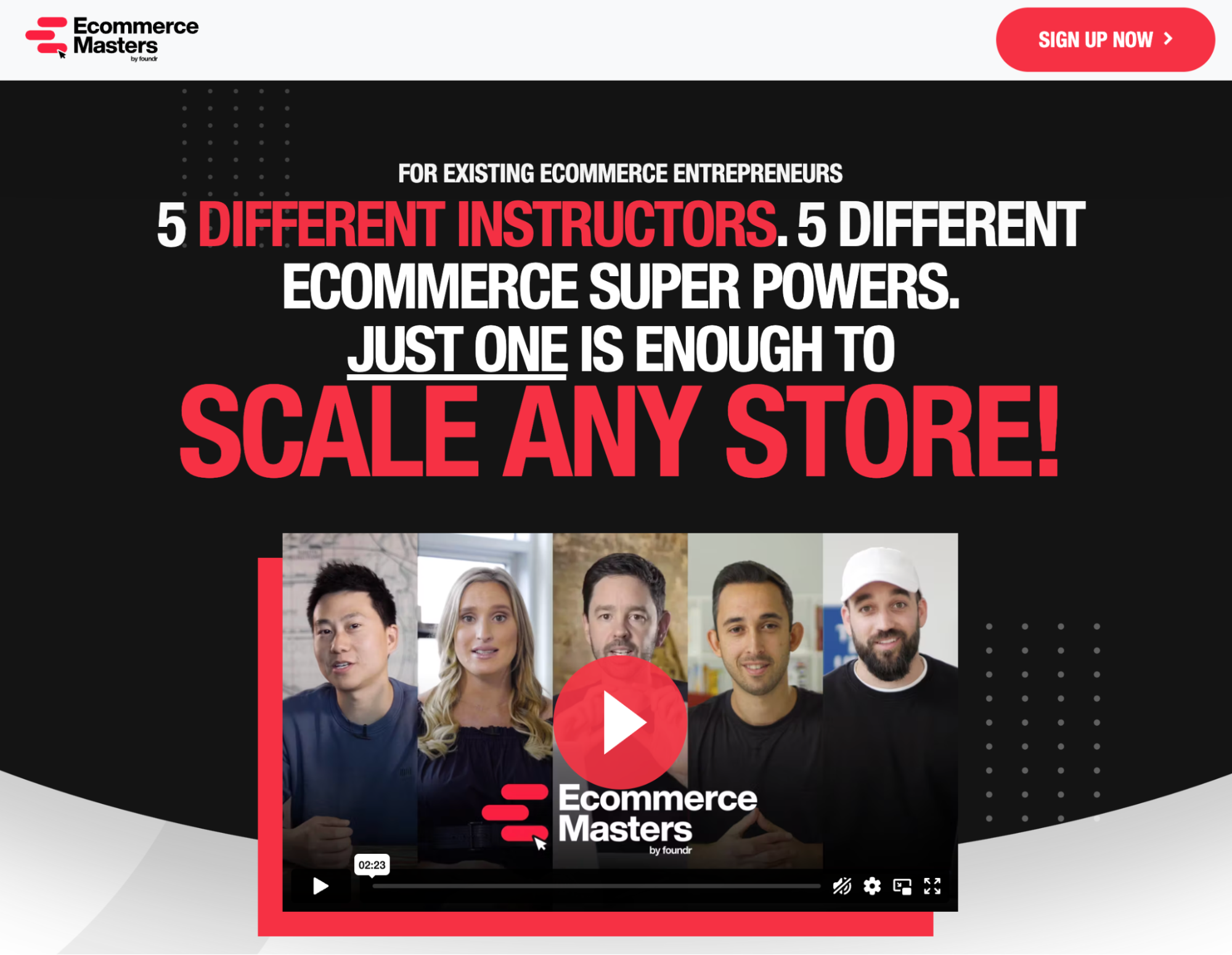
Instructors: Gretta Van Riel, Rob Ward, Rich Li, Chase Dimond, Nick Shackelford
Ecommerce Masters is a specialized training program for entrepreneurs scaling their existing ecommerce businesses. Created by Foundr, a global education company, Ecommerce Masters features five expert instructors, each with their own strengths and successful track records in ecommerce.
Together, these experts share insights derived from their experiences, like handling $85 million in Facebook ad spend, winning Shopify’s Build-A-Business competition, and achieving $1 million sales days using influencers.
The course gives practical, actionable advice on scaling your ecommerce business to seven figures, via 62 video lessons. It also includes a number of bonuses, like access to a private Facebook group, templates for product pages, and strategies for email marketing.
Cost: $2,997
Length: 9 hours
4. Ecommerce Marketing Training Course: Learn an Introduction to Ecommerce Marketing
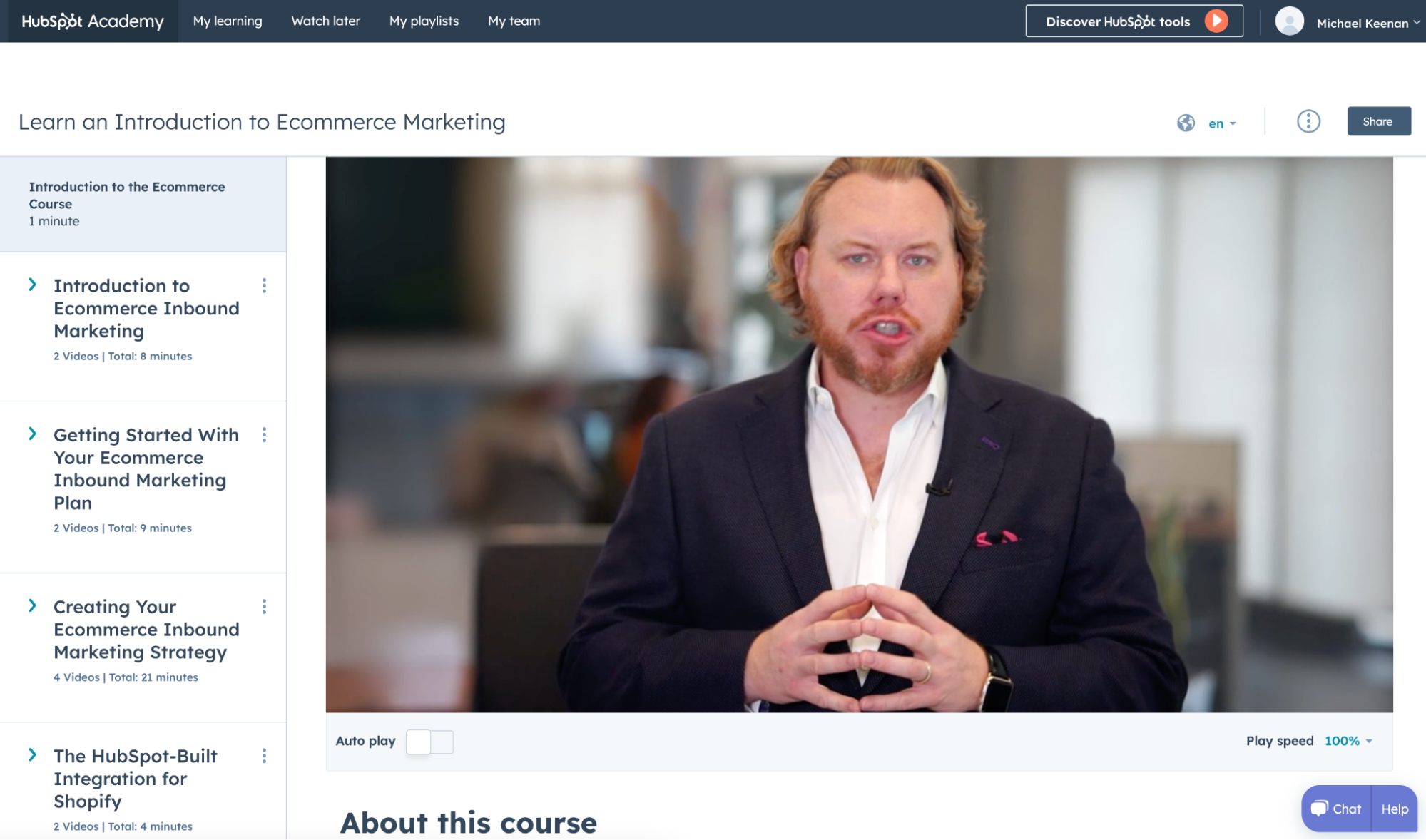
Instructors: Ethan Giffin and Anni Kim
This marketing-specific course from Hubspot covers ecommerce marketing and online advertising fundamentals, including how to set goals for your online store, create a buyer persona, and nurture leads through the sales funnel.
In addition to four lessons, there are three quizzes and 10 videos, which makes the course interactive and fun. It’s about 33 minutes long, but it covers a lot of ecommerce marketing strategies in a concise but comprehensive way. It’s great for people that like hands-on learning.
You’ll also learn how to use Hubspot’s Shopify integration to capture data from your Shopify store, create new audience segments, and launch automated marketing campaigns.
Cost: Free
Length: 33 minutes
5. Foundations of Digital Marketing and E-commerce by Google
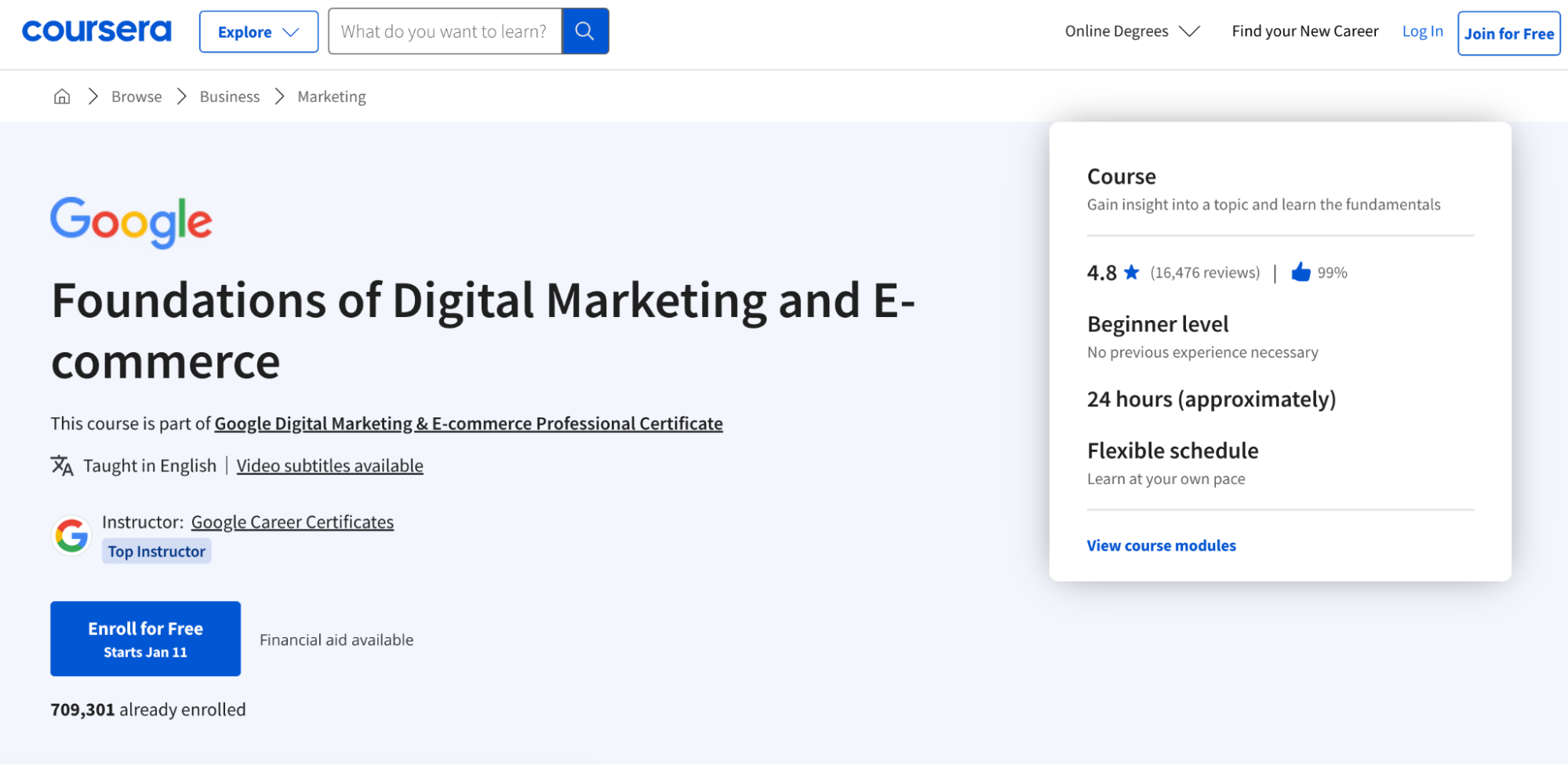
Instructor: Google employees
The Foundations of Digital Marketing and E-commerce course is part of the Google Digital Marketing and E-commerce Professional Certificate. It includes four modules:
- Introduction to foundations of digital marketing and e-commerce
- The customer journey and the marketing funnel
- Digital marketing and e-commerce strategy
- Measure performance success
This course will provide you with the skills you need to get started in ecommerce. It’s ideal for those with entry-level roles who need to learn how to attract new customers, engage customers on digital channels, and drive purchases.
The course is guided by Google employees who work in the field, offering relevant real-life examples and activities. It currently has a 4.8 out of 5 star rating on Coursera with more than 16,000 reviews.
Cost: Free
Length: 18 hours
6. SEO Training for Beginners
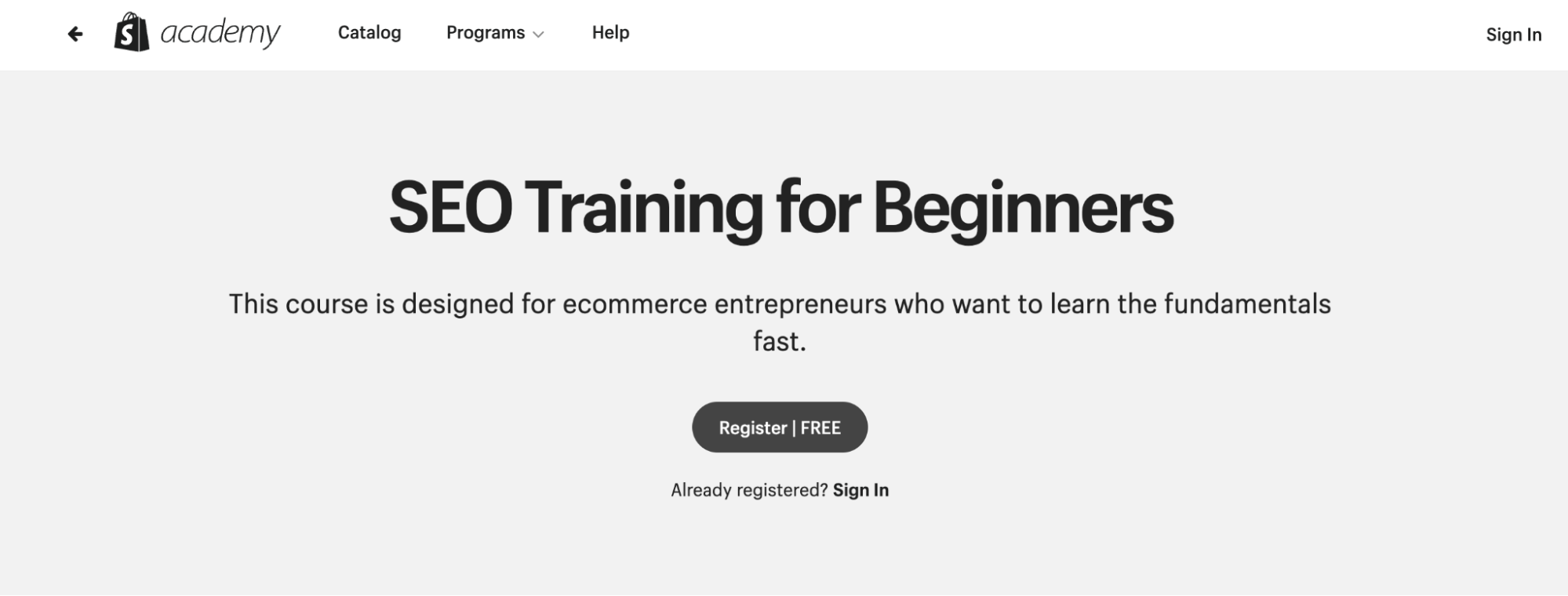
Instructor: Casandra Campbell
This free Shopify course covers the fundamentals of SEO strategy for ecommerce business owners. You’ll learn how to perform keyword research, implement on- and off-site SEO tactics, and use analytics to track your performance. The curriculum also includes a three-step framework that you can repeat to generate more traffic to your site and scale your business.
Cost: Free
Length: 1 hour 1 minute
7. Foundations: Introduction to Cross-Border Selling
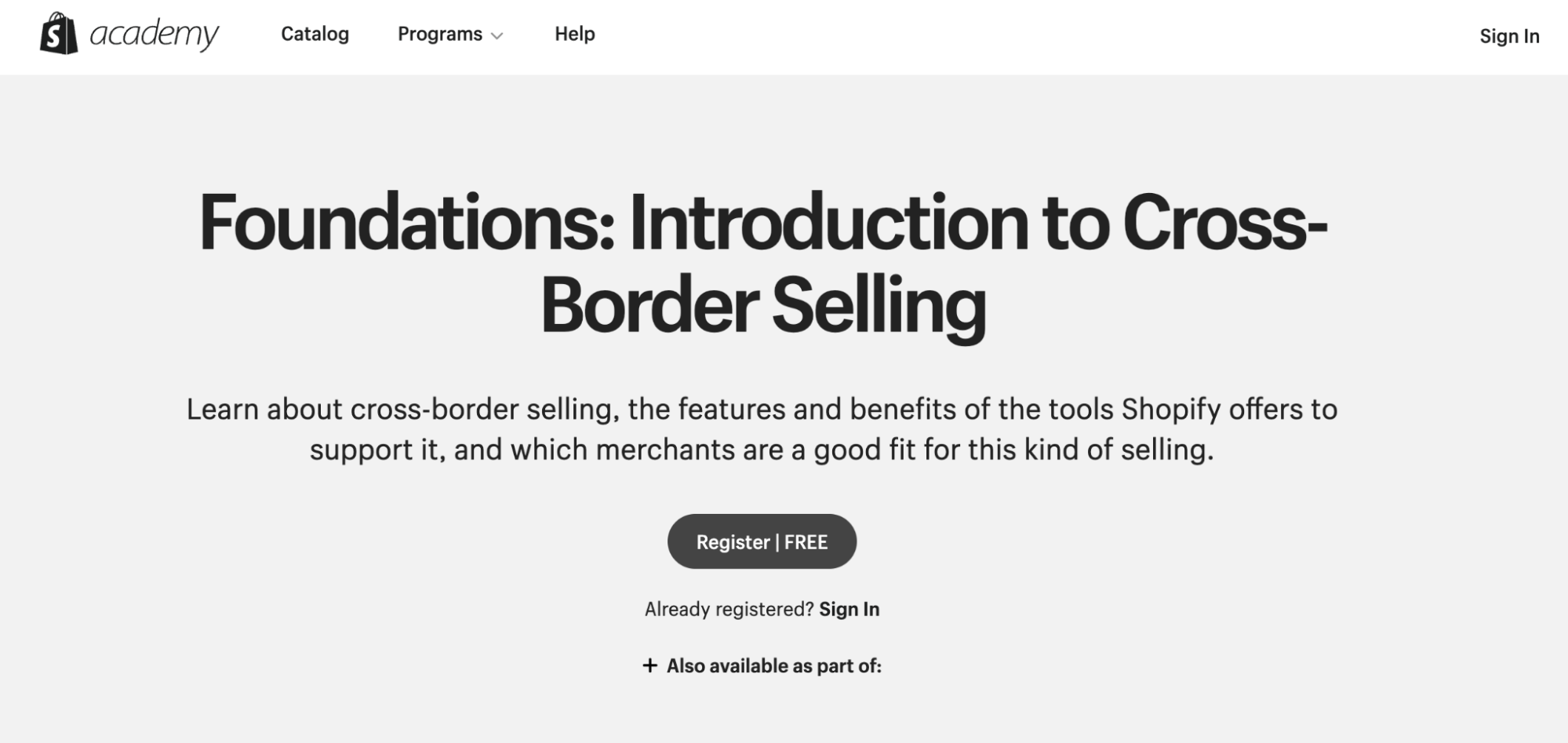
Another free course from Shopify, this Foundations course is essential for understanding the concepts and strategies of crossborder selling, also known as “going global.” If you’re looking to sell outside of your home country, this course will cover all the Shopify tools that support international commerce and how to use them effectively.
This ecommerce course is free and includes a knowledge check assessment that guarantees you understand the taught concepts.
Cost: Free
Length: 120 minutes
8. Ecommerce Marketing Certification by CXL
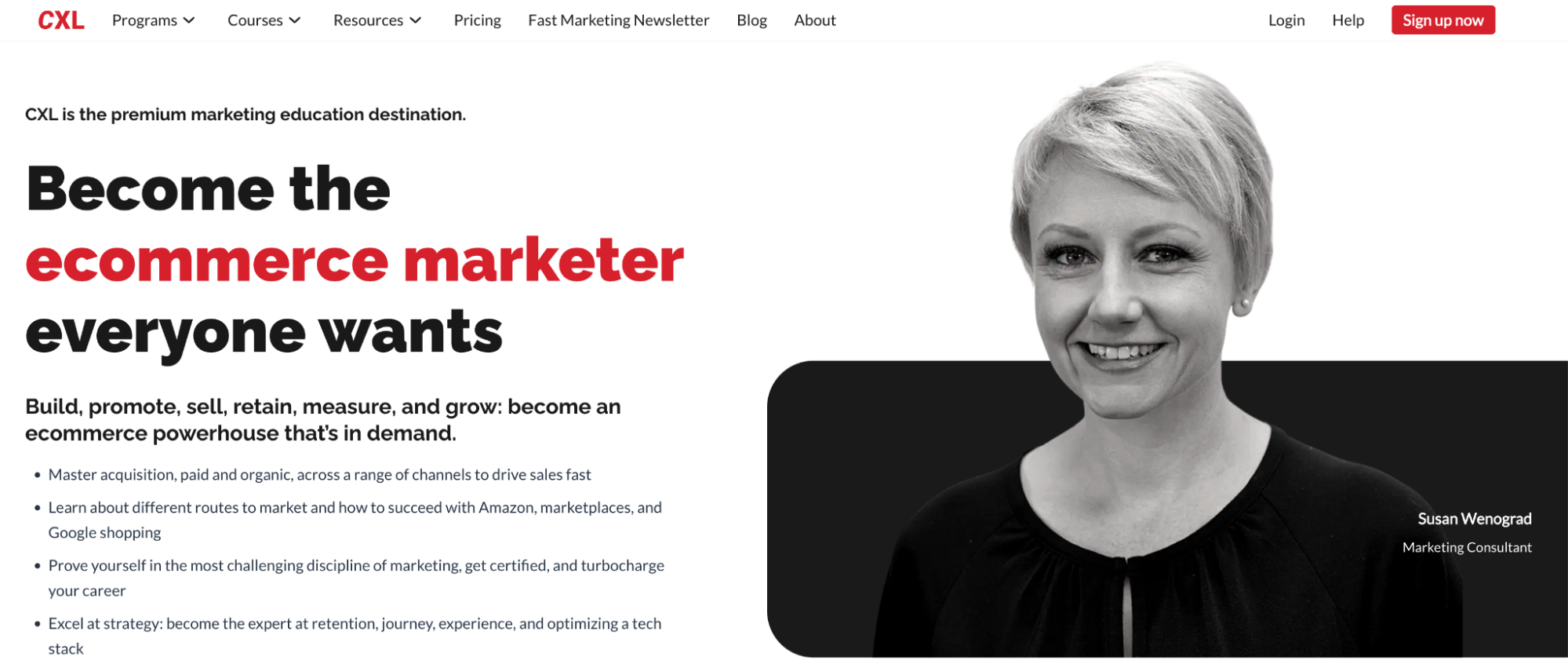
Instructors: 9 expert instructors in ecommerce
CXL’s Ecommerce Marketing Certification program is geared toward marketing practitioners and founders of ecommerce brands. This certification is taught by top ecommerce marketers who have worked with well-known brands like Heineken, Crocs, and Appsumo.
This extensive mini-degree covers a wide range of topics required for ecommerce marketing today. Each of the courses in this program are taught by an expert in the field of analytics, optimization, content marketing, advertising, and management. As part of its commitment to providing high quality instructors, CXL provides webinars, research studies, and guides, as well as additional resources to take into your business.
If you’re looking to become an expert at ecommerce marketing, you’ll find this program valuable, due to its in-depth course content and practical skills.
Costs: Must sign up for a CXL subscription, which starts at $289 per month
Length: Depends on many study hours per week put in
9. Ecommerce Fundamentals by LinkedIn
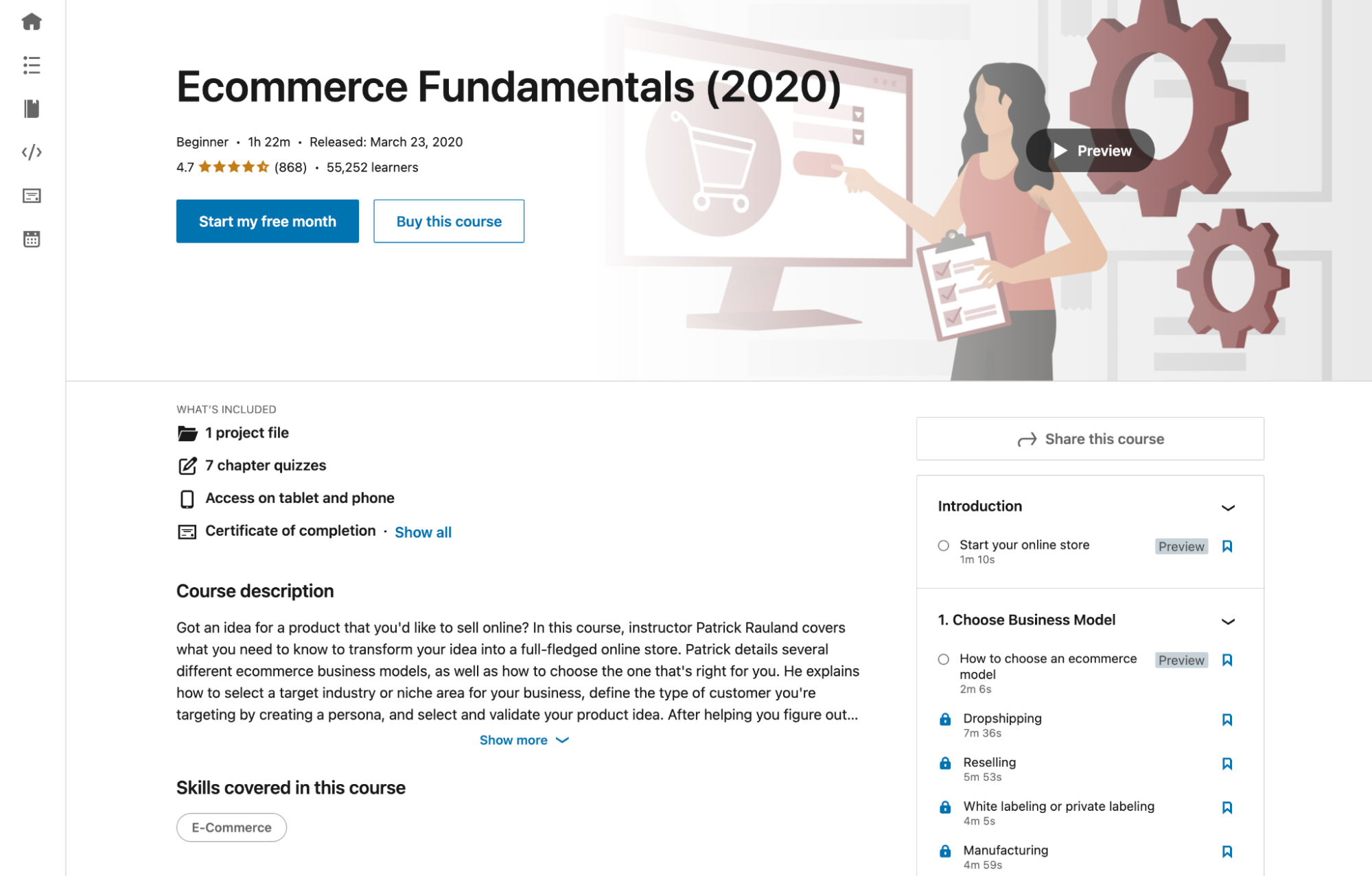
Instructors: Patrick Rauland
The Ecommerce Fundamentals course on LinkedIn comes well-regarded, with a 4.7 out of 5 star rating on the platform. Despite being created in 2020, its basic teachings of ecommerce are still relevant.
The course walks you through every step of developing an ecommerce business idea. You’ll learn all the possible ecommerce models, like dropshipping and reselling, as well as tactics for selecting and evaluating your ecommerce idea. Patrick Rauland also goes through lessons on defining your target audience, and more practical steps like brand development and getting a business license.
If you’re a fan of LinkedIn Learning and a beginner in ecommerce, this fundamentals course is the best choice.
Costs: Free when signing up for LinkedIn Learning
Length: 1 hour 22 minutes
10. Become A Certified E-Commerce Marketing Master by DigitalMarketer
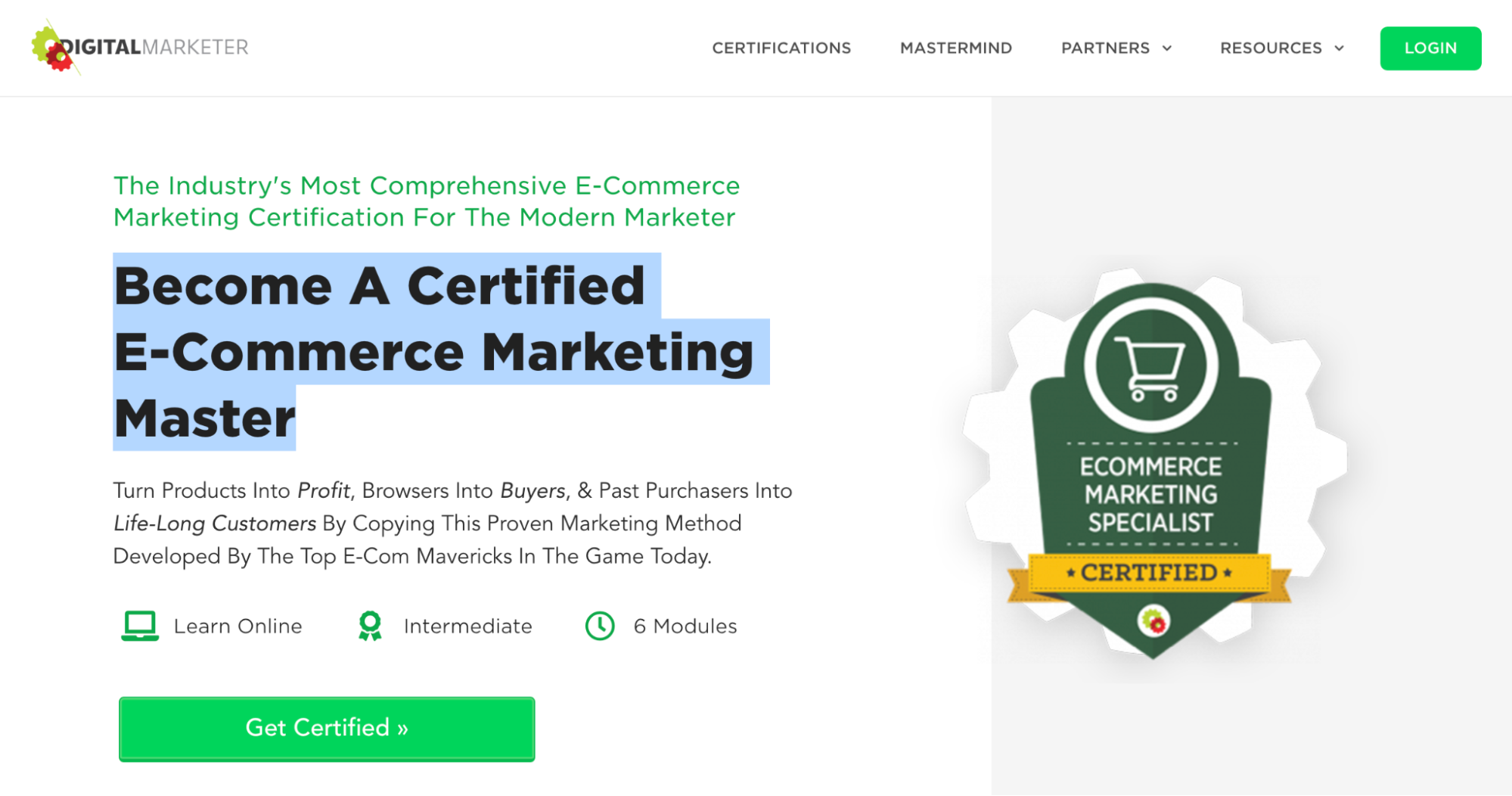
Instructors: Scott Cunningham, Lauren Petrullo, Simon Trafford
If your store is set up and you’re ready to make sales, this ecommerce certification course from DigitalMarketer is a great next step. It addresses the two biggest issues in ecommerce—lack of traffic and sales—by focusing on product-market fit, positioning, and proven conversion strategies.
The curriculum offers proven frameworks used by three vetted instructors:
- Lauren Petrullo: Founder of Mongoose Media and content marketing expert with experience in PPC and social media. She has worked with The Walt Disney Company and owns several marketing businesses.
- Scott Cunningham: Founder of leading Shopify Partner agency, Social Lite, and brings expertise in scaling Shopify stores and digital advertising.
- Simon Trafford: Co-founder and head coach for Merchant Mastery and managing director for Social Lite Communications, specializing in Facebook and Google Ads, email marketing, and CRO.
Marketing professionals and ecommerce brand owners will get everything they need and more from this certification, including templates, checklists, and tools for product pages, product descriptions, storefronts, email campaigns, and ads, along with quizzes and bonus content.
Costs: $495
Length: Self-paced and depends on your study hours
Benefits of taking an ecommerce course
There are four benefits of taking an ecommerce course:
- Building your support network. As an ecommerce business owner, you’re less likely than your brick-and-mortar counterparts to run into industry peers out in your community. Online courses are a great way to meet fellow ecommerce business owners and build your support network. If your custom t-shirt business is impacted by supply chain issues, for example, you can call your custom apron friend for the lowdown on active suppliers.
- Acquiring customers. Whether taking courses in-person or virtually, you might meet potential clients in the process. Likewise, building relationships with other business owners can open the door to collaborations that increase your customer base or generate word-of-mouth referrals.
- Increasing your skills. An online ecommerce course can help you quickly build the skills needed to grow your business, from starting an online store to navigating tax season.
- Validate your success. There’s value in proving what you know. Some online ecommerce courses offer certificates for particular skill sets (like social media marketing or email marketing), which can boost your professional reputation. These stamps of approval may also allow you to charge more for your work.
Steps to choose the right ecommerce course
- Identify your business goals
- Determine your immediate needs
- Set your time and technology budget
- Research ecommerce courses
- Choose your course
Online ecommerce courses serve a range of audiences. Whether you’re a new business owner or an experienced marketing professional, here’s how to choose the right one:
1. Identify your business goals
Start by assessing your business’s goals, so you know where you want to head. Are you planning to build your vintage ottoman shop into an international leader in curating and shipping the finest 20th century ottomans? Or are you simply hoping to turn a hobby into a source of passive income? The answer will determine your ecommerce training needs.
2. Determine your immediate needs
Identify what you need right now. If you spend all your free time running social media accounts, a social media management course can help optimize your strategy and reclaim hours.
If you’d like to drive more traffic to your website, consider a digital marketing specialization course that covers lead generation tactics like email marketing, search engine optimization, and content marketing.
3. Set your time and technology budget
Determine how much time you can devote to ecommerce training and how much you’d like to pay to enroll. Remember, there are many courses you can enroll in that are free.
4. Research ecommerce courses
Review content from trusted online sources and thoroughly research course options. Consult business publications like Forbes or Business Insider, blog content from ecommerce platform providers, or guides (like this one) to compare.
You can also poll other ecommerce business owners in your network for recommendations. As you explore courses, keep notes on curriculum topics, cost, length, and any available certifications.
5. Choose your course
The rest is easy: Compare your immediate business needs and budget limitations with the ecommerce course offerings and select the best option for you and your ecommerce business.
Ecommerce courses FAQ
What are common topics covered in ecommerce courses?
- Marketing strategy
- Digital marketing
- Business operations
- Business development
- Finance
What are the 3 types of ecommerce?
- B2C (business-to-consumer): This is where businesses sell goods or services to customers. Think how Allbirds sells its own products online and ships orders to customers itself.
- B2B (business-to-business): This is where one business sells to another business. Transactions are usually high volume—think hundreds of items versus one or two.
- C2C (consumer-to-consumer): This model refers to marketplaces that allow consumers to sell to other consumers. eBay is the most popular example of C2C commerce.
What is the best way to learn ecommerce?
The best way to learn ecommerce is by combining theory and practice. Study the basics with a course, then apply the knowledge directly by starting your own ecommerce store. You’ll be able to see first hand how everything works, like market research, ecommerce platforms, ads, and customer service.
Are ecommerce courses necessary for starting an online business?
Although you can start a successful ecommerce business without taking an ecommerce course, many ecommerce business owners find that ecommerce courses help them reach their goals faster (and save time and money along the way) because they’re being more intentional about what it takes to start an online business.
Can ecommerce courses be taken online or in person?
Many popular ecommerce courses are offered online. If you prefer to take an in-person course, consult your local university, community college, or chamber of commerce for resources.




لا تعليق